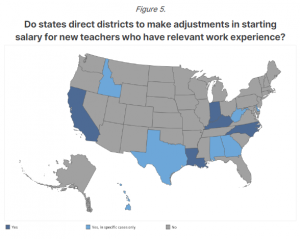In 2022, Advance CTE and Education Strategy Group, through the New Skills ready network initiative, released the Achieving Inclusive CTE Goal-Setting Tool (AICTE). This tool adds a new resource to the data toolbox for state and local CTE and career pathways leaders to assess learner group data. The goal-setting tool enables leaders to analyze CTE learner group data in comparison to the broader student population. The purpose of the tool is to support leaders with their efforts to recruit, engage and support underrepresented learner groups to increase access to high-quality Career Technical Education (CTE) programs and career pathways.
 Over the past six months, four states, Alabama, Indiana, Louisiana and Utah, have participated in a technical assistance cohort to leverage the AICTE Goal-Setting Tool to evaluate the inclusivity of their system and establish goals to improve equitable access and outcomes for learner populations in their states. The cohort of technical assistance included two workshop sessions to review the tool and its analyses; ongoing support and coaching calls with each state team to guide the use of the tool in their states; and two Communities of Practice sessions to share promising solutions and discuss shared challenges. The two states that completed the pilot of the Goal-Setting Tool, Colorado and South Carolina, were also invited to attend the Communities of Practice sessions.
Over the past six months, four states, Alabama, Indiana, Louisiana and Utah, have participated in a technical assistance cohort to leverage the AICTE Goal-Setting Tool to evaluate the inclusivity of their system and establish goals to improve equitable access and outcomes for learner populations in their states. The cohort of technical assistance included two workshop sessions to review the tool and its analyses; ongoing support and coaching calls with each state team to guide the use of the tool in their states; and two Communities of Practice sessions to share promising solutions and discuss shared challenges. The two states that completed the pilot of the Goal-Setting Tool, Colorado and South Carolina, were also invited to attend the Communities of Practice sessions.
Lessons Learned
Over the course of the technical assistance cohort, key themes and lessons learned emerged from the states using the Achieving Inclusive CTE Goal-Setting Tool:
- The Achieving Inclusive CTE Goal-Setting Tool Supports Perkins Performance Indicators;
- The Achieving Inclusive CTE Goal-Setting Tool is a Strong Companion in the Comprehensive Local Needs Assessment Process; and
- The Achieving Inclusive Goal-Setting Tool Supports Data Tools Alignment.
Continue reading for detailed information on the lessons learned and examples from the states who participated.
The Achieving Inclusive CTE Goal-Setting Tool Supports Perkins Performance Indicators: The AICTE Goal-Setting Tool analyzes data for 11 indicators across all learner populations. This level of analysis includes gender, race and ethnicity and special populations (English learners, Migrant learners, Economically Disadvantaged and Learners with disabilities). The disaggregated design of the Goal-Setting Tool supports users in drilling down specific areas for improvement and support. Utah is utilizing the tool to support one of its Perkins performance indicators: nontraditional participation. With the help of the AICTE Goal-Setting Tool, the team will leverage the data analysis to identify areas where their state and local leaders can make a greater impact to increase nontraditional participation and understand if the adjusted performance targets the state has set are reasonable to achieve.
As the team works towards achieving its Perkins performance goals, the Utah team will also conduct a state-level analysis of nontraditional participation for multiple years to compare the data and identify any changes in the groups over time. Additionally, the state team plans to conduct training to support local leaders with the use of the Goal-Setting Tool and allow them to enter their own data to identify opportunities for a more inclusive CTE system. The team will provide this training to local CTE leaders during the winter months of 2023 and will align the Goal-Setting Tool with their Opportunity Gap Analysis workbook and data.
With the assistance of the Goal-Setting Tool, the team shared that the greatest benefit is having more insightful data analysis in conjunction with their Opportunity Gap Analysis. According to the team, using the tools together offers a greater understanding of the CTE system and areas where learners need to be recruited, supported or engaged.
The Achieving Inclusive CTE Goal-Setting Tool is a Strong Companion in the Comprehensive Local Needs Assessment Process: One of the many use cases for the Goal-Setting Tool is the examination of equity and disaggregated learner performance data as part of the Perkins V Comprehensive Local Needs Assessment (CLNA). The Goal-Setting Tool takes a deeper dive into the CTE continuum to identify priority areas for Perkins plans. The team in Indiana is taking full advantage of the Goal-Setting Tool with their CLNA process by planning to include training on the use of the goal-setting tool in their next round of Equity Labs. Equity Labs are regional sessions held across the state to share the importance of equity and inclusivity in CTE programs and career pathways.
The Goal-Setting Tool will support Indiana’s CLNA process by providing a tool to facilitate a deep dive into each district’s data. The state team plans to supply regional and district CTE leaders with the Achieving Inclusive CTE Goal-Setting Tool to analyze data, set a goal to increase equity and inclusivity and implement a practical strategy to achieve the goal.
To use the Goal-Setting Tool to its full potential in Indiana’s CLNA process, the team plans to provide local CTE leaders with ongoing support and opportunities for follow-up to ensure locals are leveraging root-cause analysis to better understand data trends. The state plans to leverage the tool for continuous monitoring of the practical strategies and interventions deployed to create a more equitable and inclusive CTE system.
The Achieving Inclusive Goal-Setting Tool Supports Data Tools Alignment: Each state selected to participate in the pilot and technical assistance cohort previously completed the Opportunity Gap Analysis Train-the-Trainer workshop, a workshop that prepares CTE leaders to provide comprehensive training on the importance of equitable access to high-quality CTE, demonstrates how to conduct a percentage point gap analysis to identify gaps among learner groups including race and ethnicity, gender and special populations and conducting a root-cause analysis to understand the implications on the data.
The AICTE Goal-Setting Tool is the next phase of data analysis work to support inclusive and equitable CTE systems: analyzing the current representation of learners in CTE programs compared to the learners that could be engaged, recruited and/or supported in CTE and setting goals to achieve a more equitable system.
While these tools complement each other in their analyses and findings, participants using the tools identified the importance and value of ensuring the two tools work together and clearly communicating the alignment of the tools to their local-level CTE leaders and practitioners. Colorado is making progress leveraging both tools with their local-level CTE leaders and practitioners. To support the local-level use of the tools, the Colorado state agency provided the Opportunity Gap Analysis dashboard to their local-level teams. Then it provided guidance on using the AICTE Goal-Setting Tool. By leveraging the two tools together, locals were able to identify opportunity gaps in CTE enrollment and then further drill down on equitable access and inclusivity in every stage of the CTE continuum across specific CTE programs using CIP code-level data. Conducting analysis with CIP code-level data allows districts within a state an opportunity to identify where they have gaps. As districts continue to leverage both tools, they can work collaboratively with industry partners to expand access to CTE career pathway programs and work-based learning opportunities.
To ensure alignment between the tools, the Colorado team launched both tools to every district and consortia to review regional data to account for small n-sizes. The Colorado team has held several sessions on data quality and interpreting the data dashboards. These sessions include guidance and support to identify trends in the data. The state team continues to offer support sessions and office hours to discuss all data-related issues.
As the team looks ahead, they plan to leverage the two tools in their Perkins state plan revisions. The team will begin regional meetings for the Comprehensive Local Needs Assessment (CLNA) to gather input for the state plan to ensure it includes robust and diverse perspectives especially when setting state performance targets. The state team will set Perkins performance targets leveraging both the Opportunity Gap Analysis dashboard and the AICTE Goal-Setting Tool.
Looking Ahead
The Achieving Inclusive CTE Goal-Setting Tool is a strong data analysis tool for CTE leaders and Advance CTE is committed to supporting states with the use of the tool to achieve more inclusive and equitable CTE systems. In the coming months, Advance CTE will launch a second round of technical assistance to guide participants through the use of the tool, provide individualized coaching and support for states using the tool and elevate the promising approaches and successes from the use of the tool. To learn more about this cohort of technical assistance and apply, please visit this form.
If you have any questions about the Achieving Inclusive CTE Goal-Setting Tool or the upcoming technical assistance cohort, please contact Haley Wing, Senior Policy Associate, Advance CTE at [email protected].


 Tell me more about your journey to the Fellowship.
Tell me more about your journey to the Fellowship.

 Lawmakers Agree to Meet Next Week on Debt Ceiling
Lawmakers Agree to Meet Next Week on Debt Ceiling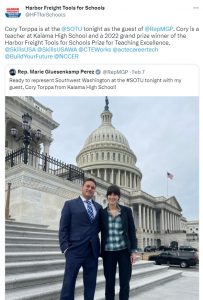 Just two weeks later, First Lady Jill Biden’s guests for the State of the Union (SOTU) address included Kate Foley– a 10th-grade computer-integrated manufacturing student who the First Lady had met last year during a visit to CTE programs in Rolling Meadows High School. In addition, Rep. Glusenkamp Perez (D-WA) brought Cory Toppa, a construction, engineering design, and manufacturing teacher at Kalama High School and the director of CTE for the Kalama school district.
Just two weeks later, First Lady Jill Biden’s guests for the State of the Union (SOTU) address included Kate Foley– a 10th-grade computer-integrated manufacturing student who the First Lady had met last year during a visit to CTE programs in Rolling Meadows High School. In addition, Rep. Glusenkamp Perez (D-WA) brought Cory Toppa, a construction, engineering design, and manufacturing teacher at Kalama High School and the director of CTE for the Kalama school district. 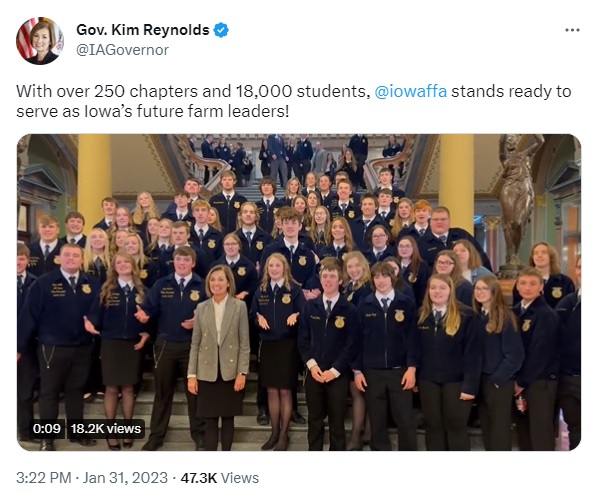
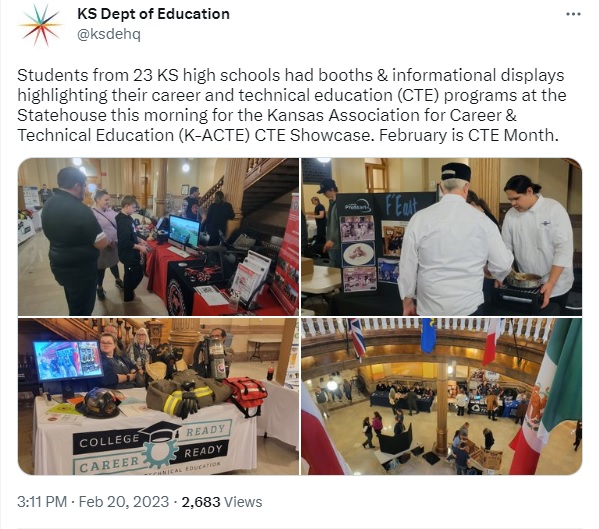
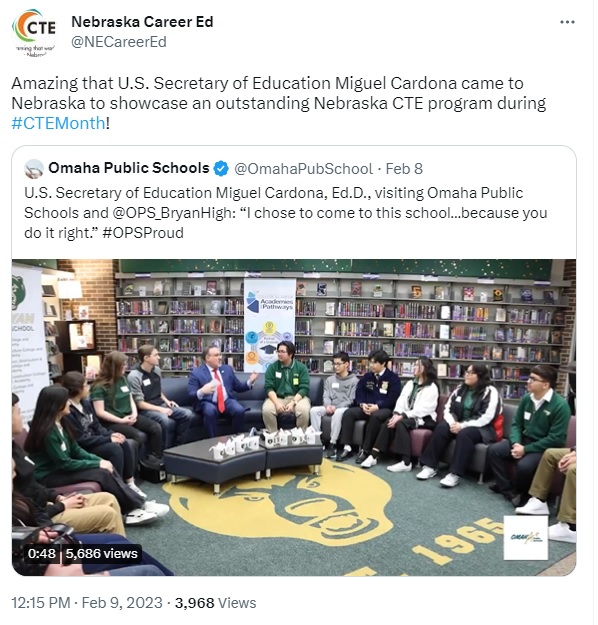
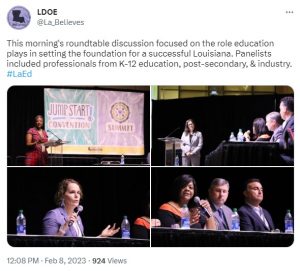
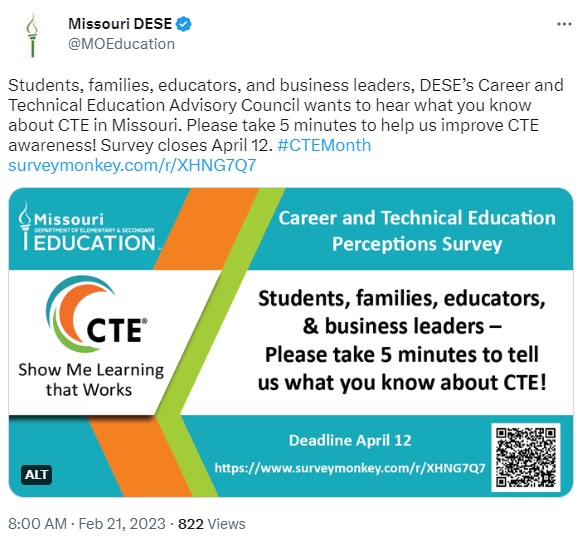
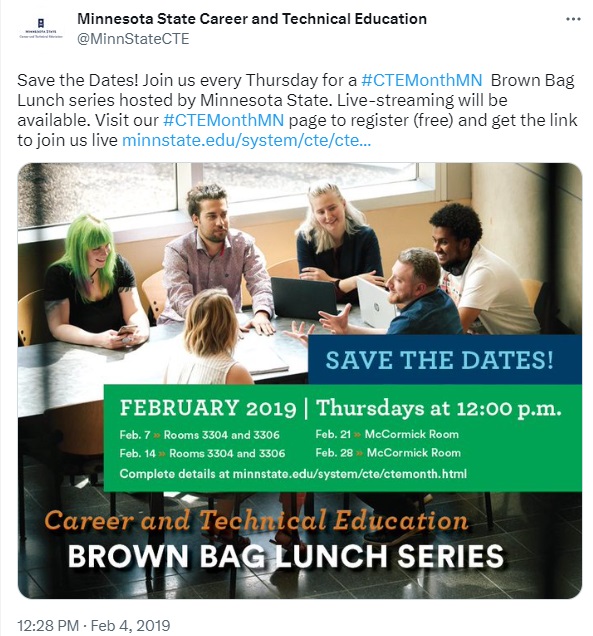
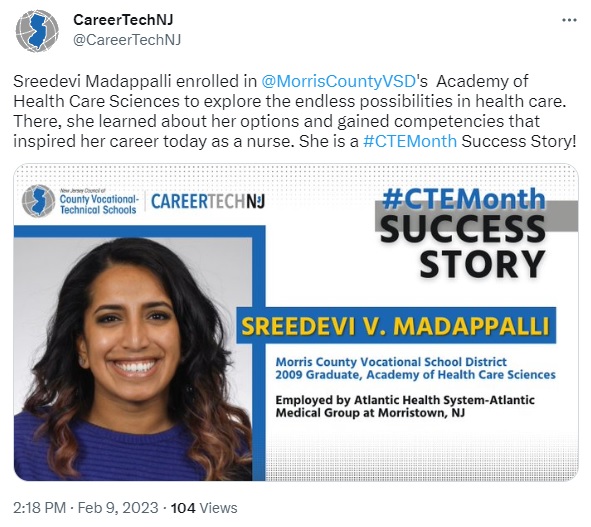
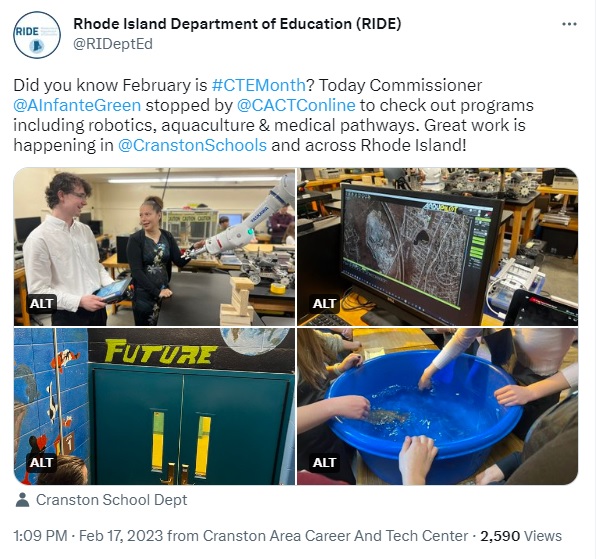
 Kayla Brossett, Louisiana
Kayla Brossett, Louisiana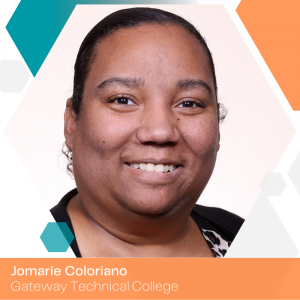 Jomarie Coloriano, Wisconsin
Jomarie Coloriano, Wisconsin 
